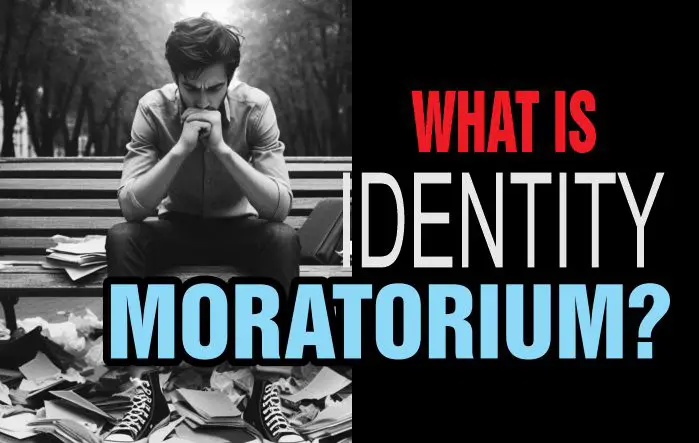Learn how individuals navigate the phase of identity moratorium as they battle with decision-making in their personal development.
Identity exploration is a crucial stage in the development of personal identity.
It often involves trying out different roles, beliefs, and lifestyles before committing to a specific identity.
This process, as proposed by psychologist Erik Erikson, is a fundamental part of achieving a cohesive and authentic sense of self in adolescence and beyond.
Related: Comprehensive Guide to Identity
Identity Moratorium Definition
Identity exploration is a developmental stage characterized by active exploration and experimentation in various roles, values, and beliefs.
Coined by psychologist Erik Erikson, it represents an important period in an individual’s quest for self-understanding and identity formation.
During this phase, typically occurring in adolescence but also relevant in later stages of life, individuals engage in a process of questioning and testing different aspects of themselves before committing to a stable identity.
This exploration is essential for the development of a cohesive and authentic sense of self and plays a significant role in shaping an individual’s future choices and commitments.
The Theory of Identity Moratorium
The concept of identity moratorium was initially introduced by renowned psychologist Erik Erikson in his theory of psychosocial development.
According to Erikson, identity formation is a significant task during adolescence, and it continues to evolve throughout our lives.
He believed that individuals go through different stages of identity development, and identity moratorium serves as a pivotal stage in this process.
During the identity exploration stage, you experience a sense of confusion and disorientation, as you question established norms and explore alternative paths.
This exploration may involve trying out different hobbies or activities, engaging in new relationships, or testing out different ideologies or belief systems.
It is a time of intense self-reflection and self-discovery, as individuals actively seek to define who they are and what they want in life.
Related: Understanding Identity Foreclosure
Characteristics of Identity Moratorium

One common characteristic of identity exploration is the willingness to engage in contradictory or opposing behaviours.
For example, an individual may experiment with multiple career paths, explore different religious or spiritual beliefs, or engage in various social activities that contradict one another.
This contradiction is a natural part of the moratorium stage, as individuals are actively testing different identities to determine what feels most authentic to them.
In addition to self-exploration, the identity exploration stage also involves interaction with the external world.
This interaction enables individuals to gather experiences and perspectives that contribute to their self-discovery.
By engaging with diverse people, cultures, and ideas, individuals can broaden their horizons and develop a well-rounded understanding of themselves and the world around them.
Related: What is Identity Diffusion and What Determines it?
How Long Does Identity Exploration Last?
Identity exploration is not bound to a specific timeframe, and its duration varies from person to person.
Some people may experience a relatively short period of moratorium, while others may spend years exploring different aspects of their identity.
The duration depends on factors such as personal circumstances, social and cultural influences, and individual resilience.
Identity Moratorium Examples
1. Finding the Right Career Path: Exploring Interests in College
As a teenager, you’re taking various college courses and volunteering in different fields to gain practical experience. This helps you discover your passions, figure out what excites you, and decide which career path aligns with your skills and interests.
2. Questioning Religious Beliefs and Values: Navigating Your Spiritual Journey
You’re questioning your religious beliefs and values by exploring different religions and philosophies. Reading diverse texts, attending services, and engaging in meaningful discussions help you understand where you stand and find a belief system that resonates with you.
3. Reflecting After a Long-Term Relationship: Focusing on Self-Discovery
After ending a long-term relationship, you’re focusing on self-reflection to understand your own needs and desires. This time of solitude allows you to grow personally, clarify what you want in a future relationship, and strengthen your sense of independence.
4. Exploring Sexual Orientation: Understanding Your Feelings
You’re in the process of understanding your sexual orientation by reflecting on your feelings and attractions toward different genders. Participating in LGBTQ+ support groups and reading relevant resources provides valuable insights into your identity and helps guide your journey.
5. Understanding Cultural Identity: Discovering Where You Belong
As you question your cultural identity, you’re researching your family’s history, visiting your ancestral homeland, and engaging in cultural events. This process helps you understand where you fit in, embrace your roots, and connect more deeply with your heritage.
Benefits of Identity Moratorium
The benefits of engaging in identity exploration are numerous. It allows you to build resilience by challenging your beliefs and embracing uncertainty.
It promotes personal growth, as you gain a deeper understanding of your strengths, weaknesses, passions, and values.
This understanding enhances decision-making skills, leading to better life choices aligned with personal satisfaction and fulfillment.
Identity exploration also encourages empathy and open-mindedness.
By exploring diverse perspectives and interacting with different individuals, you develop a broader mindset and a deeper appreciation for the complexities of human experiences.
This increased empathy not only enhances personal relationships but also contributes to a more inclusive and compassionate society.
Challenges of the Identity Moratorium
However, the identity exploration stage is not without challenges.
The uncertainty and confusion that accompany this stage may lead to anxiety, stress, or a sense of feeling lost.
You may struggle with making decisions or experience a fear of commitment.
It is crucial for you going through this phase to seek support from trusted friends, family members, or professionals who can provide guidance and reassurance.
Overcoming Identity Moratorium Challenges
Parents and educators also play a vital role in supporting individuals navigating the moratorium stage.
They can create an environment that encourages open dialogue, non-judgmental discussions, and the exploration of different possibilities.
By promoting a safe and supportive space, parents and educators can help individuals feel more comfortable in expressing their thoughts, feelings, and uncertainties.
Frequently Asked Questions
What is identity moratorium?
It is a period of exploration and experimentation with different roles, values, and beliefs without making firm commitments.
How does identity moratorium relate to adolescence?
Adolescents often experience moratorium as they explore various identities before settling on a stable sense of self.
Is identity exploration a necessary stage of development?
Yes, it is considered a normal and important phase in the process of identity formation during adolescence.
What are some examples of identity moratorium?
Examples include trying out different career paths, exploring religious beliefs, or experimenting with various social roles and relationships.
Final Thoughts
Identity moratorium is an essential stage in the development of your identity.
It involves a period of exploration and experimentation, where you actively seek out different experiences and options to gain a deeper understanding of yourself.
It allows you to challenge societal norms, explore diverse perspectives, and ultimately develop a more authentic and fulfilled sense of self.
While it may come with challenges, the benefits of engaging in this stage are immense, leading to personal growth, resilience, empathy, and enhanced decision-making skills.
References:
- https://strategiesforparents.com/identity-moratorium-a-key-status-in-human-development/
- https://ecoleglobale101.medium.com/ways-to-identity-moratorium-in-tweens-and-teens-78518808c5b6
- https://papers.ssrn.com/sol3/papers.cfm?abstract_id=4242832
- https://steemit.com/psychology/@smashedturtle/psychology-moratorium-identity-and-definition-of-aduldhood
Pious Clements is the insightful voice behind "The Conducts of Life" blog, where he writes about life ethics, self-development, life mastery, and the dynamics of people and society.
With a profound understanding of human behaviuor and societal dynamics, Pious offers thought-provoking perspectives on ethical living and personal growth.
Through engaging narratives and astute observations, he inspires readers to navigate life's complexities with wisdom and integrity, encouraging a deeper understanding of the human experience and our place within society.
